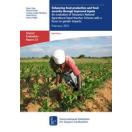
Enhancing food production and food security through improved inputs
3ie Impact Evaluation Report 23
In Tanzania, agriculture accounts for 27 per cent of GDP, 80 per cent of employment and 75 per cent of household income. It is a key component of the country strategy for poverty reduction. The National Agriculture Input Voucher Scheme (NAIVS), implemented since 2008 by the Ministry of Agriculture, Food Security and Cooperatives, provides a 50 per cent subsidy, through vouchers, for the purchase of chemical fertiliser and improved seed to maize and rice farmers. This study by Vavier Gine, Shreena Patel, Cristina Cuellar-Martinez, Sandi McCoy and Lauren Ralph evaluates the impact of NAIVS across Tanzania.
The findings do not show impacts on incomes, food security or educational attainment in the short term. However, the disenfranchised position of female-headed households relative to their male counterparts is clearly indicated. Female farmers were positively inclined toward the programme and its ability to help boost agricultural yields. But many of them could not afford the top-up payment and, as a result, did not participate. To make NAVIS more effective, the study recommends that the programme should be targeted better and a provision for transfer and sale of vouchers included.




